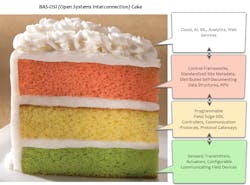The word "open" means different things to different people and the word’s meaning is defined by the audience and its interests. Just returning from AHRExpo Orlando and a very successful Open discussion for an Open Future presentation by our young contributing editors, our dream team for Open thinking. Who knew they had baked their thoughts into a cake complete with icing! Here are links to the session PDF and a Video recording of the complete session. What a great session! I had to sit on the floor because the room was full to overflowing. And in the audience was a real-time interrupter repeating all that was said. Fun times with thoughts being shared globally. Good material for all of us learning what open means.
We were talking in the last chapter about Born Again Connected. Session presenters showed us that means, as well as being born again Open, something which Generation Z takes as a given.
It is actually very simple. Interoperability is something that users must demand. Nothing will change until end users such as building owners, specifying engineers, or systems integrators demand interoperability. They need to know what “OPEN” means and vote for that with their dollar. After all, our buying power is the most powerful voting power that we possess. We vote with our dollar for all kinds of things every day. In another scenario where full interoperability makes its way into the BAS industry is a massive disruption. A massive disruption to the industry would be if a manufacturer offers truly “OPEN” automation solutions, all other companies would have to follow or perish.
We have been at this for a while. Check out this article by Nirosha Munasinghe MBusIT BSc BE (Hons) (Melb) Product Development Manager with Open General from back in 2010: ‘Open’ is the most fundamental key word:
The word ‘Open’ is a very powerful word in the English language. It can be argued that the word ‘Open’ is the most fundamental key word that has driven the BAS industry over the last decade and will continue to drive it in the future. Open standards, open protocols, open architecture and open web are some of the key concepts in the BAS industry. The Oxford dictionary defines open as allowing access, passage, or a view through empty space; not closed or blocked. Each one of us interprets the meaning in many ways. This is no different in the BAS industry. Therefore, although ‘Open’ has driven the BAS industry, it also has created confusion. This article unveils the intricacies of the word ‘Open’ in the BAS industry and defines key elements that the stakeholders need to be aware of when interpreting the word ‘Open’…
This article - Open or closed? - Can Bill Gates and Microsoft make it right the second time? by Nicolas Waern "The IoT - Building Whisperer" – continues the discussion:
Zach, and I, believe that - “PROPRIETARY” should really be an enhancement in functionality and security as a layer on top of the “OPEN” interoperability layer. In the sense that I am writing this in Word, but could have used something else if I wanted to. I can save it in a format of choosing, porting it between PCs, Apples, to whatever program, for free, and still have it work independently of whatever hardware I was using.
Folk that are Born Again Connected expect and demand all definitions of Open. Let’s look at another definition in this article, Revolution within Smart Buildings by Alper Üzmezler, BASSG LLC:
We have been busy writing the open-source project called Project Sandstar. We had set sail to merge Sedona Framework and Project Haystack and we were investigating how it could work. Should we put haystack on top or bottom or both? Why are we merging the two? What is our goal? We found an answer:
The first answer to the question was to create complete hardware-agnostic direct digital controls. By creating hardware-agnostic DDC, our revolutionary feelings erupted. WHAT IF? This leads to hardware-agnostic direct digital controls. Meeting after meeting with five different hardware manufacturers; seemed like the industry players only wanted to protect their built channels, which is understandable. After spending six months with potential OEMs jumping on board with Project Sandstar, we changed our route and started manufacturing and selling to close partners to test devices further. We also applied to pitch festivals to explain the technology stack. We pitched our goals at the US-China innovation summit, V2V innovation, Energy Thought Summit, Haystack Connect events, demonstrating our solution to many firms. During this time, we focused on technology completion progress and pilot projects.
Here is An Updated Overview of the Open Source VOLTTRON Platform and the Growing Eclipse VOLTTRON™ Ecosystem by Andrew Rodgers, ACE IoT Solutions and Frédéric Desbiens, Eclipse Foundation:
In this updated overview of the Eclipse VOLTTRON™ platform (the technology’s new name reflects its status as an open-source project of the Eclipse Foundation), we showcase several notable deployments of Eclipse VOLTTRON™ and identify the unique value of the platform across diverse use cases. Municipalities, universities, utilities and their partners are utilizing the Eclipse VOLTTRON™ platform for different reasons and for different purposes. To us, the varied use cases demonstrate that there is - to build upon White and David’s imagery – more and more icing on the Eclipse VOLTTRON™ cake.
Here is an important VOLTTRON document, The MQTT Historian agent publishes data to a MQTT broker. Just case you were wondering, What is MQTT?
MQTT[2] (MQ Telemetry Transport) is an open OASIS and ISO standard (ISO/IEC PRF 20922)[3] lightweight, publish-subscribe network protocol that transports messages between devices. The protocol usually runs over TCP/IP; however, any network protocol that provides ordered, lossless, bi-directional connections can support MQTT.[4] It is designed for connections with remote locations where a "small code footprint" is required or the network bandwidth is limited.
Why I Move (Back) to Open Source for Messaging, Integration and Stream Processing, by Kai Waehner, Enterprise Architect and Global Field Engineer at Confluent:
Openness: Available for free and really open under a permissive license, i.e. you can use it in production and scale it out without any need to purchase a license or subscription (of course, there can be commercial, proprietary add-ons – but they need to be on top of the project, and not change the license for the used open-source project under the hood)
Maturity: Used in business-relevant or even mission-critical environments for at least one year, typically much longer Adoption: Various vendors and enterprises support a project, either by contributing (source code, documentation, add-ons, tools, commercial support) or realizing projects
Flexibility: Deployment on any infrastructure, including on-premise, public cloud, hybrid. Support for various application environments (Windows, Linux, Virtual Machine, Docker, Serverless, etc.), APIs for several programming languages (Java, .Net, Go, etc.) Integration: Independent and loosely coupled, but also highly integrated (via connectors, plugins, etc.) to other relevant open source and commercial components
Although not truly Open, for now, I think Niagara is the closest thing we have to an industry open operating "OT" network. Here are some of the advantages, as spelled out by Marc Petock, Chief Marketing and Communications Officer for Lynxspring:
Horizontal IP Niagara Architecture from Lynxspring
Single, Unified Software platform and tool
Eliminate comms devices and complexity
Direct access to any device
Vulnerability, patching and remediation – easier and faster
Legacy integration capabilities
Application integrations
Secure IP network
Simplified installations
Choice
If the Open question is something you want to explore, there’s no better place to find answers than at the Niagra Summit, NS2020, scheduled to be held in San Diego this April 19-21. From the Niagra Summit homepage:
Niagara Framework® is at the heart of some of the most successful projects for intelligent buildings, smart campuses and projects focused on enterprise-scale, portfolio-wide energy-efficiency management across the globe. You don’t want to miss this biennial event when systems integrators, facility managers, consulting engineers, and other stakeholders in the Niagara Community come together to push the state-of-the-art in data-driven operations. The Niagara Summit is all about knowledge-sharing and ideas — with forums, presentations and breakout sessions relevant to your business and your customers, now and in the future.
For even more on the Niagra framework: https://www.ccontrols.com/tech/niagara.htm
The NiagaraAX Framework® is a software platform you can use to manage and control diverse systems and devices regardless of manufacturer or protocol. Use it either locally or over the Internet with a standard web browser. For managing a smart building, Niagara provides all you need-visualization, integration, control and archiving of data.
Let’s jump back a moment to look at how the industry has developed over the last 20 years in this article from Scott Cochrane, President and CEO, Cochrane Supply & Engineering, Planning for The BAS IP Revolution THE END HAS COME!?
Integrator IT Self-Assessment:
Can you or do you work with someone that can manage IT departments effectively? Do you know the key components required to set up a stand-alone, managed IP network? Can you self-manage or host a customized cloud solution on a network for your customer? Do you understand how to cyber protect a building control system? Do you have a company policy for setting up or accepting remote IP communications to a building control system?
Let’s talk about the most basic Open, open information. Because our AutomatedBuildings.com scrapbook of industry thoughts has been online 21 years using open HTML, we can still share content on any social media platform today. Now that is future-proofing using Open. HTML (HyperText Markup Language) is the most basic building block of the Web. It defines the meaning and structure of web content. We are able to share all our past with all our future. HTML is not owned by anyone. It was developed by W3C and WHATWG (Web Hypertext Application Technology Working Group), and these organizations work to evolve HTML.
I am very pleased that folks find our kaleidoscopic 3D flyover with hyperlink connections useful. We created it to share freely via our online scrapbook of thoughts linked with a few HTML clicks to each month's article, interview, reviews, new products and news. Thousands of pieces of Building Automation history for anyone to quickly catch up with what we have witnessed, and it still grows monthly. Please thank our sponsors and advertisers and the complete industry’s support that has allowed for the creation and maintenance of your free online resource.
About the Author
Ken Sinclair
Editor/Owner/Founder
Ken Sinclair has been called an oracle of the digital age. He sees himself more as a storyteller and hopes the stories he tells will be a catalyst for the IoT future we are all (eventually) going to live. The more than 50 chapters in that ongoing story of digital transformation below are peppered with HTML links to articles containing an amazing and diverse amount of information.
Ken believes that systems will be smarter, self-learning, edgy, innovative, and sophisticated, and to create, manage and re-invent those systems the industry needs to grow our most important resource, our younger people, by reaching out to them with messages about how vibrant, vital and rewarding working in this industry can be.

